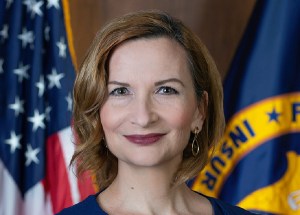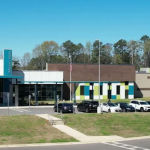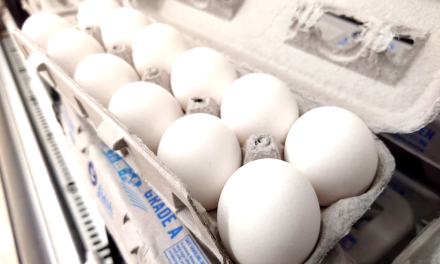By PK Semler, Special to the AFRO
The powerful chairwoman of the Federal Deposit Insurance Corporation (FDIC), Jelena McWilliams, last week launched a USD 120m investment fund targeting businesses and investments in underserved Black America and minority communities through FDIC insured minority-owned banks and financial institutions.
During the press conference call, September 16, to announce the Mission-Driven Bank Fund, McWilliams said she was inspired to launch the fund after watching an episode of ABC’s investment reality TV show “Shark Tank” on one of her many flights across the country.
Unlike “Shark Tank” hosts like Mark Cuban making dubious investments decisions in a few minutes between ads — it will be respected community bankers such as Joseph Haskins, Jr. of The Harbor Bank of Maryland of Baltimore; B. Doyle Mitchell, Jr of the Industrial Bank of Washington DC; Kenneth Kelly of First Independence Bank of Detroit, Michigan; and Cynthia Day of Citizen Trust Bank of Atlanta, Georgia deciding on the merits of any business plan.
FDIC’s McWilliams convinced Microsoft Corp. (NASDAQ: MSFT) CEO Sayta Nadella; Truist Financial Corporation (the merger of BB&T and Suntrust banks) CEO William H. Rogers Jr.; and formerly Bethesda, MD-based Discovery, Inc media conglomerate CEO David Zaslav to become anchor investors with an initial cash contribution of USD 120 million.
However, McWilliams said that she expects others to join the original three anchor investors under the privately managed for-profit fund under the auspices of the FDIC and that every dollar invested by the Mission-Driven Bank Fund will be leveraged by at least to 10-to-1, thus making McWilliams “Shark Tank” fund a USD 1 billion war chest for black/brown businesses and neighborhoods.
McWilliams agreed the fund is the perfect vehicle to target investment to solve the food desert crisis in Baltimore and much of urban America.
“The way it will be structured is that the community itself will not be able to make a direct pitch (but we will) have some community representation on the advisory committee of the fund,” McWilliams said. “Community activists and groups can basically approach Minority Depository Institutions (MDIs) and Community Development Financial Institutions (CDFIs) in their area and say: ‘hey listen, we can really benefit from opening up a chain of grocery stores that can bring healthy food to the neighborhoods and they can work with the MDIs and CFDIs to bring the business proposals…and hopefully find grocers are willing or able to do this.’”
Adding to the McWilliams answer, FDIC chief of staff Brandon Milhorn specifically named Joseph Haskin’s Harbor Bank, where community groups and individuals can pitch a business plan to bring in new grocery stores and healthier food choices to their food desert neighborhoods.
The FDIC fund is a veritable godsend for Sandtown/Easterwood community activist and Baltimore civil rights icon, Marvin J. “Doc” Cheatham, who has been leading a multi-year battle to re-open a grocery store in Matthew Henson Elementary school area that has been without a decent food store for the first time since WWII.
“What we see in our community is not a food desert but a food apartheid,” Doc Cheatham said.
Cheatham sathe Matthew Henson Community Development Corporation has already identified and established an area where a new food market can be built and operated using land abandoned by out-of-town landowners.
Cheatham and residents of Sandtown/Easterwood of West Baltimore and East Baltimore activist Gary Crum and residents near the now closed Save-A-Lot on 929 North Caroline Street can now go directly to The Harbor Bank with their business proposals to access funding for new grocery stores from the FDIC investment fund without seeking favor from city, state, or federal officials.
“The Baltimore Development Corporation run by Colin Tarbert should be called the Baltimore White Development Corporation as they do nothing for our communities,” Cheatham said.
Tarbert declined any comment when contacted by The AFRO.
Even Baltimore’s arabbers — who deliver fresh vegetables using horse and buggies directly to the homes of food desert residents of East and West Baltimore — are also interested in pitching Harbor Bank for funds to institute a credit card system to receive SNAP payments, said Baltimore arabber Pete Butler.
The FDIC “Shark Tank” fund will go a long way to solving the intolerable disparity and continuation of economic discrimination against Black business and their communities.
McWilliams, unlike the ABC reality TV show, has very real sharp teeth as the nation’s top cop of American banks.
This is article is part of multi-media series “Securing the Bag,“ focusing on the most effective responses and solutions to Baltimore’s food insecurity; the series is funded by a grant from Solutions Journalism Network. See more on AFRO.com
The post FDIC’s McWilliams launches game changing USD 1bn “Shark Tank” fund for Baltimore food deserts, black business #SecuringTheBag appeared first on AFRO American Newspapers .










